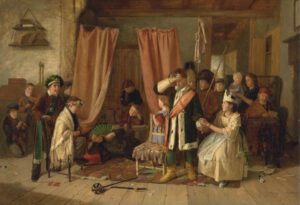Metagenre
16th International Connotations Symposium
You can find the articles that followed up this symposium in its special issue behind the link.
July 26 - 28, 2021
Eberhard Karls University Tübingen (online)
- Charles Hunt – Children acting the ‘Play Scene’ from “Hamlet,” Act II, Scene ii (Wikimedia Commons)
It has often been observed that Shakespeare’s Midsummer Night’s Dream is a metaliterary and metadramatic play. It presents not only the rough course of true love but also the glories and failures of the poetic imagination and of theatrical illusion, most obviously so in connection with the play within the play performed by Bottom and his fellows. What has less often been pointed out is the argument about genre(s) that is conducted in A Midsummer Night’s Dream. Peter Quince refers to the play within the play as a “most lamentable comedy” (1.2.11); the list of entertainments offered to Theseus describes it as “tragical mirth” (5.1.57). More than 300 years later, Ford Madox Ford similarly plays with the term tragedy in The Good Soldier. The narrator of the novel initially rejects the label of tragedy for the events he is presenting, preferring to describe them as “the saddest story,” but by the end of his narrative he has changed his mind, calling the story a tragedy indeed. Our symposium will focus on works that, like A Midsummer Night’s Dream and The Good Soldier, reflect on the genre(s) to which they belong; this self-reflection may be either explicit or implicit. Questions to be dealt with include: What are the techniques used to make self-reflexive statements about genre? Are parodies by definition examples of metagenre? Do the reflection on genre and the performance of genre in one and the same work support or undermine each other? Is metagenre an indication of genre change or genre crisis? Are some genres more likely to become self-reflexive than others (e.g. sonnets about sonnets)? How significant is the concept of genre after the romantic emphasis on originality and uniqueness?
Programme
You can also download the programme as PDF here.
Monday, July 26
13:00 Welcome
Introductory Reflections
Chair: Angelika Zirker
13:15 Burkhard Niederhoff (Ruhr University Bochum), “An Introduction to Metagenre”
14:15 David Fishelov (The Hebrew University of Jerusalem), “Parodies of Six-Word Stories: A Humorous Version of Metagenre”
15:15 Break
Metagenre on the Stage
Chair: Burkhard Niederhoff
15:45 Mirjam Haas (Mainz University), “‘What death?’: Death as Genre Marker in The Duchess of Malfi”
Anny Crunelle Vanrigh (Université de Paris Nanterre), “Tragedy vs. Trauerspiel: Metagenre in The Duchess of Malfi”
17:30 Break
Chair: Lena Linne
18:00 Dorothea Flothow (University of Salzburg), “Victorian Theatrical Burlesque as a Comment on Theatrical Genres and Conventions”
19:00 Ilana Gilovich (Columbia University), “Body of Work: Genre and Gender in Hannah Gadby’s Nanette”
Tuesday, July 27
The Epic from Homer to the Twenty-First Century
Chair: Matthias Bauer
13:30 David V. Urban (Calvin University), “Metagenre in Milton’s Paradise Lost and Paradise Regained: Its Relevance to Milton’s Presentation of Epic Heroism”
14:30 Thomas Kullmann (Universität Osnabrück), “Self-conscious Epic: Metageneric Reflexion in Byron’s Don Juan”
15:30 Break
16:00 Lena Linne (Ruhr University Bochum), “‘Sing, Muse, he said, and I have sung’: Metageneric Reflection in Contemporary Rewritings of the Homeric Epics”
17:00 Break
Metagenre in Poetry
Chair: Burkhard Niederhoff
17:30 Jonathan Nauman (Vaughan Association), “Remaking the Pastoral: Critique and Performance in Henry Vaughan’s ‘Mount of Olives’ Poems”
18:30 Matthias Bauer (Eberhard Karls University Tübingen), “The Love(s) of Plants: Erasmus Darwin’s Ambiguous Metagenre”
Wednesday, July 28
Metagenre in Fiction
Chair: Angelika Zirker
14:30 Tom Zille (University of Cambridge), “This Tragic Acting: Metageneric Reflection in the Novels of Ivy Compton-Burnett”
15:30 Break
Chair: Lena Linne
16:00 Judith Saunders (Marist College), “An Intriguing Case of Failed Satire: Edith Wharton Probes Metageneric Problems in ‘The Descent of Man’”
17:00 Adelheid Rundholz (Johnson C. Smith University), “Chutnifying Genre: Salman Rushdie’s Midnight’s Children”
18:00 Break
Chair: Matthias Bauer
18:30 Katrin Berndt (MLU Halle-Wittenberg), “‘Speak, Mnemosyne’: The Poetics and Performance of Genre in Petinah Gappah’s Memoir-Novel The Book of Memory”
